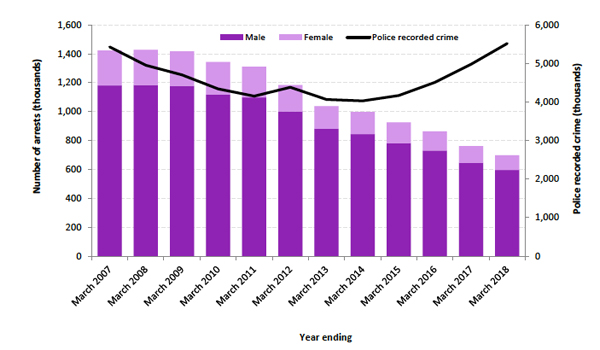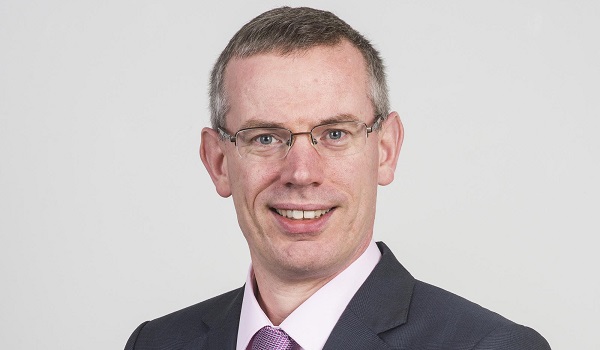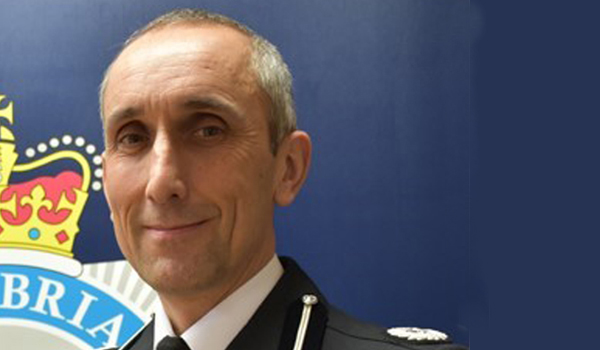Stop search and arrests at record lows
The number of stop and searches carried out in England and Wales in the year to March 2018 was the lowest since current data collection started in March 2002.
Government statistics also show that the number of arrests made by forces in England and Wales continue to fall despite rising crime levels.
There was a fall of seven per cent in the overall number of stop and searches undertaken in England and Wales, from 304,132 the previous year down to 282,248.
The figures are revealed in the Police Powers and Procedures for England and Wales report published on Thursday (October 25) showing the latest fall in overall stop and searches follows a steep decline that began in 2014 when then Home Secretary Theresa May sought to re-focus the use of the powers.
But the rate of decline in the use of the powers in the year ending March 2018 is less than the year before, which is believed to be due to Metropolitan Police Service Commissioner Cressida Dick’s recent drive to use the tactic more to combat knife crime in the capital, particularly with the uplift in section 60 of the Criminal Justice and Public Order Act empowered stop and searches.
The figures also show a seven per cent drop in arrests resulting from stop and search, from 51,844 to 48,014. Although the overall number of stop and searches has fallen to the lowest on record, as a proportion, the number of stops that led to an arrest are the highest on record.
In 70 per cent of stop and searches, the result was ‘No further action’, but arrests were made in 17 per cent of cases, and the remaining 13 per cent ended with an alternative outcome.
Cleveland Police had the highest arrest rate at 28 per cent, with the City of London Police just lower at 25 per cent. The lowest stop and search arrest rates recorded in Avon and Somerset and Gwent Police, both at eight per cent.
The figures also revealed that there were five searches per 1,000 overall population in the year ending March 2018, with the Metropolitan Police Service (MPS) having the highest search rate at 15 stops per 1,000 population, although the MPS carried out almost half (48 per cent) of all stops and searches in England and Wales.
The statistics also show there has been the first year-on-year increase in the use of the power under section 60 of the Criminal Justice and Public Order Act.
The number of stop and searches utilising this legislation almost quadrupled, from 631 to 2,501.
This increase follows a sizeable downward trend since a peak of approximately 150,000 in the year to March 2009.
The ethnicity of those stopped and searched has been a controversial subject, particularly in London.
As there is a far larger BME population in the capital than the rest of England and Wales, its data are configured separately so as not to distort the overview, and vehicle only searches are excluded.
The proportion of stop and searches by ethnic group in the year ending March 2018 was 90 per cent white and 10 per cent BME across the rest of England and Wales, whereas in the area covered by the MPS, the figures were 60 per white and 40 per cent BME.
The stop and search of white individuals has dropped by 13 per cent to March 2018, while the numbers of BME individuals stopped and searched has fallen by one per cent.
In the same period, individuals considering themselves to be from BME groups were four times as likely to be stopped as those who considered themselves to be white and those who considered themselves to be black were nine-and-a-half times as likely to be stopped as those who considered themselves to be white.
The report also details a significant fall in the number of arrests for notifiable offences in the year to March 31, 2018. There were 698,737 arrests carried out by police in England and Wales, a decline of eight per cent on the year before. This is a continuation of a downward trend since 2008, when notifiable offence arrests reached a pinnacle of 1.5 million.
Labour MP and chair of the Home Affairs Select Committee Yvette Cooper said the “shocking” figures, including a 24 per cent fall in arrests for fraud confirms the finding of the committee’s report published the same day that the police are “badly overstretched and arrests are falling at same time as crimes are rising”.
However, the Home Office said arrest is just one of the powers police have to tackle crime.
A spokesperson added:“Arrest figures do not capture trends such as an increase in voluntary attendance at police stations and a greater use of other outcomes, such as community resolutions.”
Of those arrested, the vast majority remains male (85 per cent). Of the total arrests for notifiable offences, 38 per cent were in relation to violence against a person, against a corresponding figure of 25 per cent of police recorded crime, and 20 per cent related to theft offences, against 36 per cent of all Office for National Statistics (ONS) recorded crime to March 2018.
In the year ending March 2018 there were 29,662 detentions under section 136 of the Mental Health Act 1983, although more effective IT systems may have had an influence on some forces’ better recording of these detentions. When the data from these forces was excluded, there was still a rise of five per cent.
Analysis of the demographics of section 136 detainees shows 55 per cent were male and 95 per cent were aged 18 or over. By ethnicity, 86 per cent of detainees were white, six per cent black, four per cent were Asian, and two per cent of Chinese/Japanese/South East Asian or of another ethnicity.
National Police Chiefs’ Council lead on mental health commented on Twitter that 2017/18 was “yet another year where the demand on policing is up with a five per cent increase in the use of s136 detentions, however pleasing to see the reduction in use of police custody as a place of safety. The vulnerable need proper care to get better”.
The report also covers the issue of fixed penalty notices (FPN’s) for motoring offences, showing there were 2.4 million recorded on PentiP in 2017 that resulted in an FPN or another outcome, excluding 351,520 cancelled cases.
As a proportion, 84 per cent (2,018,408) of those offences recorded were speed limit breaches, a rise of two per cent on the previous year and the highest level recorded, although there has been a gradual upward trend since 2011.
There has also been a significant increase in those attending a driver retraining course, as an alternative to paying an FPN. Of those found to have committed a motoring offence, 45 per cent took a driver retraining course. That figure was 14 per cent in 2011.
And the data for breath tests, reveals that police carried out 325,887 breath tests in 2017, the lowest number since the current data collection started in 2002, against 381,746 breath tests done in 2016, a fall of 15 per cent, although four police forces were not able to supply figures for last year.
The other forces recorded 44,893 positive or refused breath tests in 2017, down from 49,438 in 2016.
The number of positive or refused breaths tests in 2017 equates to 14 per cent of the total breath tests undertaken that year, the highest level since 2007.







